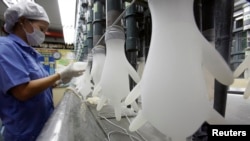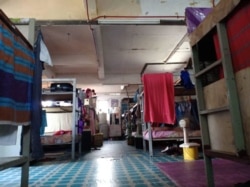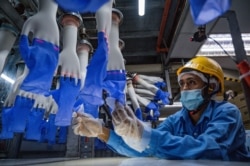The increased demand for rubber gloves amid the global coronavirus pandemic has worsened conditions for migrant workers in Malaysian factories that provide much of the world's supply of the protective wear, according to a new study by British researchers.
Drawing heavily on migrant workers from lower-income Asian countries, Malaysia churns out roughly two-thirds of the disposable rubber gloves sold worldwide, including to Britain's National Health Service. Factories have seen demand soar over the past year and a half, earning their owners record profits.
Malaysia's glove factories have been plagued by reports of abusive working conditions for years, with grueling hours for minimum wage, cramped and dingy dorms and gruesome injuries. The research by the U.K.-based Modern Slavery & Human Rights Policy & Evidence Center, pulled from surveys with some 1,500 workers, says the pandemic has made conditions worse.
Its findings were revealed in a report titled, "Forced Labour in the Malaysian Medical Gloves Supply Chain Before and During the COVID-19 Pandemic: Evidence, Scale and Solutions," on July 1.
"This is a sector where labor issues, forced labor is endemic. It's entrenched, it's longstanding, and the pandemic has seen some of those indicators worsen, in part because of the health and safety issues connected to COVID-19 and in part because of the pressures placed on production by the increased global demand for gloves," said Newcastle University professor Alex Hughes, who led the British research.
Toil and trouble
Workers told the research team that the combination of mounting orders and fewer employees, owing to international travel restrictions that made it tougher for factories to fill vacancies, piled pressure on them to work harder, faster and longer.
The pandemic also made already congested conditions in the workers' dormitories, some cramming in 30 or more people to a room, all the more dangerous. Those close quarters were the breeding ground for a spike in COVID-19 cases late last year and for Malaysia's worst wave of infections up to that point.
"The fact that you've got workers, and actually a significant proportion of workers, not able to take their days off, I think that is a massive issue," said Hughes. "The congested accommodation is another one — congested accommodation anyway, but under a pandemic situation is hugely problematic."
Hughes said those surveyed for the U.K. study reported working an average of 12.02 hours a day, just over the 12 hours allowed by law, which means that some were working more, and that about a third had gone a month without a day off. About one in 10 had not had a single day off in three months.
Forced labor
Researchers used the United Nations International Labor Organization's 11 signs of forced labor to take the measure of Malaysia's rubber gloves sector.
It found evidence of a rise in four of them: abusive working and living conditions, movement restrictions, isolation, and excessive overtime, which the ILO defines as more hours than allowed by local laws or performed under threat.
The team found no significant change in the levels of six other signs of forced labor — physical and sexual violence, intimidation and threats, retention of identification documents, withholding of wages, abuse of vulnerability, and deception — and found a decline in debt bondage.
The U.S. State Department downgraded Malaysia to the lowest tier in its annual Trafficking in Persons report published this month, noting the prevalence of forced labor. Washington had already placed Malaysian rubber gloves on its list of goods made with forced labor and banned imports from the country's largest producer, Top Glove Corp. Bhd, over the past year.
The Malaysian Rubber Glove Manufacturers Association, which represents the country's glove factory owners, declined VOA's request for an interview for this story.
Responding to the recent downgrade in the U.S. trafficking report, though, Malaysia's human resources minister, Saravanan Murugan, said in a written statement on Monday the government was striving to improve working conditions for migrant workers. He said officials would be reviewing the fees charged by middlemen who find them the jobs and will finalize an action plan to tackle forced labor by year's end.
'I have no choice'
Prominent labor rights advocate Andy Hall, who keeps in regular contact with Malaysia's migrant workers, agreed that the levels of forced labor in the country's glove sector were on the rise overall, despite improvements at some factories.
"We've seen so many of the workers in the industry during the COVID working every single day, so they've been working in excess of what's allowed under Malaysian law and definitely what's allowed under international standards," he said.
The ILO's Hours of Work Convention recommends no more than 56 hours of work per week.
Hall said most of the migrant workers in Malaysia's glove factories are the main breadwinners for their families back home and often eager to work extra hours. But he added that those who do try to turn down a company's call for overtime, either on top of a 12-hour shift or on an owed day off, can face consequences.
"If you go and you say, 'Look, I don't want to do overtime today,' the company will say, 'Well fine, but we're not going to give you overtime for the rest of the month. So, either you do it or you don't do it, but if you don't do it today then we won't give you it [overtime] for the next month,'" said Hall.
One assistant supervisor on an assembly line said turning down a call for overtime at his factory could get them fined, demoted or even fired.
Speaking to VOA on condition of anonymity for fear of retaliation, the 27-year-old, from Bangladesh, said his company expects production line workers to take off no more than two days a month and will dock them about $25 for every day extra. As a supervisor, he could fare worse.
"As a supervisor I have to go. If I don't go, I could lose my job or my position as supervisor, so I have no choice," he said.
When the pandemic arrived in Malaysia early last year, he said the company also bumped its workers' daily shifts up to 13 or 14 hours but brought them back down to the usual 12 toward the end of the year — but only after auditors showed up and told management to cut back.
"It's not by law, it's not by contract; it's their rules. They have more orders, so that's why they do it," he said.








